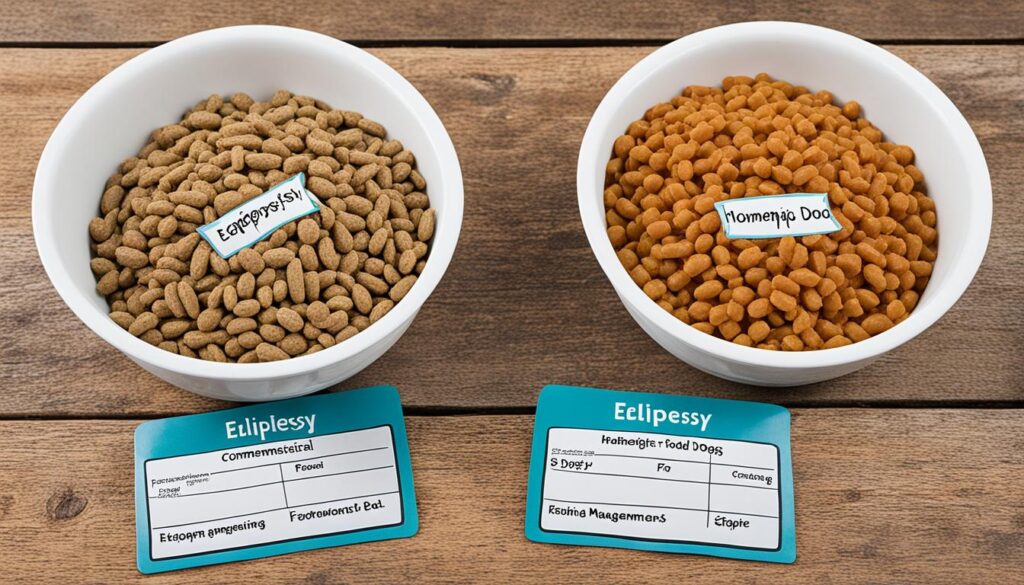Dietary Approaches to Managing Canine Epilepsy

Did you know 0.75% of dogs suffer from epilepsy? That’s how common this chronic condition is in our fur babies. As a pet owner I’ve learned that diet plays a big role in managing epilepsy in dogs. Special diets can help control seizures and overall health.
The field of canine epilepsy management is growing, with new studies on diet’s benefits. Many dog owners change their pet’s diet after finding out about epilepsy. This change is based on studies that show diet can really help reduce seizures and improve behavior.
A study found that adding MCTs to a dog’s diet can reduce seizures. This could mean new dog food for seizures. Some dogs even stopped having seizures on a high fat ketogenic diet. That’s how big of a role diet plays in epilepsy.
Dogs with epilepsy need to be on different diets. I’m looking into different diets like ketogenic and MCT rich foods and how they can help your dog.
Key Takeaways
- 0.75% of dogs are affected by epilepsy, dietary management is key
- 2/3 of dog owners change their dog’s diet after an epilepsy diagnosis
- MCT enhanced diets show promise in reducing seizure frequency
- Ketogenic diets can work wonders for some dogs
- Customised diets are essential for effective epilepsy management
Understanding Canine Epilepsy: An Overview
Managing canine epilepsy is brain health for your dog. As a vet I’ve seen it affect many pets. Let’s look into canine epilepsy to see what it is and what the treatment options are.
Prevalence and Predisposition in Dogs
About 0.75% of dogs have epilepsy, some breeds more than others. I’ve found 26 breeds have inherited epilepsy. Beagles, Border Collies and Labrador Retrievers are the most prone.

Common Symptoms and Diagnosis
It’s hard to spot epilepsy in dogs. Watch for seizures, which can come in clusters. Seizures are scary but knowing what to look for can prevent them. If your dog has more than one seizure a month, it’s time to get treatment.
Traditional Treatment Methods
Medication is used to treat canine epilepsy. Most dogs on these meds can live normal lives. Some may need changes to their meds over time. We want to keep the dog’s brain healthy while we control the seizures.
| Treatment Approach | Effectiveness | Side Effects |
|---|---|---|
| Anticonvulsant Medication | High | Mild to Moderate |
| Dietary Changes | Moderate | Minimal |
| Lifestyle Adjustments | Supportive | None |
The Role of Nutrition in Epilepsy Management

Nutrition is key in managing dog epilepsy. An epilepsy diet for dogs can greatly help with seizures and brain health. Studies show that changing diets can cut down on seizures in many dogs with idiopathic epilepsy.
A study found that medium-chain triglycerides (MCTs) in special dog food cut seizures by at least 50% in almost half of the dogs. Some dogs even stopped having seizures! This is good news for pet owners looking for natural ways to help their dogs.
What a dog eats also affects its brain health. MCTs not only help with seizures but also make dogs smarter and more focused. Dogs eating MCT-rich diets were easier to train and had fewer signs of hyperactivity.
| Diet Type | Benefits | Success Rate |
|---|---|---|
| MCT-enriched | Reduced seizures, improved cognition | 71% of dogs showed improvement |
| Ketogenic | Alternative energy source, restored mitochondrial function | Similar to human success rates |
Changing your dog’s diet should always be done with a vet’s advice. Weight and urine pH can affect how meds work and seizures. With the right nutrition we can help our dogs live better even with epilepsy.
Ketogenic Diets for Dogs with Epilepsy
I’ve looked into ketogenic diets for dogs with epilepsy and they seem to work. This diet is like fasting for dogs which may reduce seizures. It changes the brain chemistry for epilepsy.
Principles of Ketogenic Diets
The diet is high in fat low in carbs for dogs. It tries to make the body use ketones instead of glucose which may reduce seizures. The diet is 70% fat 20% protein 10% carbs.

Adapting Human Ketogenic Diets for Canine Use
Changing human diets for dogs with epilepsy needs a lot of thought. I’ve learned that each dog’s diet must be customized. Owners and vets work together to make sure the diet is right for the dog and helps with seizures.
Potential Benefits and Challenges
A study found 21 dogs on a ketogenic diet did well. Three dogs stopped having seizures, and seven had fewer seizures by at least half. There was a 13% drop in seizures overall. But, it’s hard to keep the diet right and check ketone levels. Some dogs might not get better, and we need more research on long-term effects.
| Outcome | Percentage of Dogs |
|---|---|
| Seizure-free | 14% |
| 50% or more reduction in seizures | 33% |
| Less than 50% reduction | 38% |
| No response | 28% |
Medium-Chain Triglycerides (MCTs) in Canine Epilepsy Diets
Research on MCT oil for dogs with epilepsy is promising. A study in the Journal of Veterinary Internal Medicine looked at 28 dogs with tough-to-treat epilepsy. These dogs received either MCT oil or plain olive oil daily. The results showed that dogs on MCT oil had fewer seizures each month. Some even stopped having seizures altogether!

So, why does MCT oil help? MCTs turn into ketones fast, which might calm overactive brain cells. They’re now a key part of anti-seizure dog food. The study used a special 9% MCT diet. It helped with seizures, made dogs less anxious, and sharper mentally.
If you’re thinking about an epilepsy diet for your dog, talk to your vet. They can help you choose the right MCT oil and amount. It’s not a cure-all, but it could be a big help. Some dogs saw a 50% drop in seizures! That’s huge for pups who don’t respond well to regular meds.
Remember, every dog is different. What works for one might not work for another. But with careful planning and vet guidance, MCTs could be a game-changer for your furry friend’s epilepsy management.
Epilepsy Diet for Dogs: Key Components and Considerations
Creating an epilepsy diet for dogs needs careful planning. I’ll show you the key parts of a diet that supports brain health and helps manage seizures.
Optimal Macronutrient Ratios
A high fat low carb diet is best for dogs with epilepsy. The ratio is usually 1:1 (fat to protein+carb) this is the same as the Atkins diet for humans with epilepsy.

Essential Micronutrients for Brain Health
Key nutrients for a dog’s brain health are B vitamins and antioxidants. Omega 3 fatty acids like EPA and DHA can also calm down neurons.
Foods to Avoid in Epileptic Dogs
Some dogs should stay away from certain carbs that can cause seizures. It’s important to find and remove these triggers from your dog’s diet.
| Diet Component | Recommendation | Benefits |
|---|---|---|
| Fat | High | Supports ketosis, reduces seizures |
| Protein | Moderate | Maintains muscle mass |
| Carbohydrates | Low | Reduces potential seizure triggers |
| Omega-3 Fatty Acids | High | Reduces neuronal excitability |
Every dog is different. Work with your vet to make the epilepsy diet right for your dog. With the right diet, you can greatly improve your dog’s life.
Commercial vs. Homemade Diets for Epileptic Dogs
When it comes to feeding epileptic pets, both commercial and homemade diets work well. You can find special dog food for seizures in stores, or make your own.

Commercial diets for dogs with seizures often include MCT oil and special nutrients. These foods aim to give balanced nutrition and help with seizures. Homemade diets let you choose the ingredients but need careful planning to be balanced.
Many dogs have done well on both types of diets. For example, one dog stopped having seizures for 33 weeks on a high-fat homemade diet. But, it’s important to talk to a vet before choosing or making food for your dog with seizures.
| Commercial Diets | Homemade Diets |
|---|---|
| Convenient | Customizable |
| Formulated by experts | Control over ingredients |
| May contain preservatives | Fresh ingredients |
| Limited variety | Varied menu options |
Whichever diet you choose, avoid ingredients that can cause seizures. Lamb is a good protein source as it has less glutamate.
Implementing Dietary Changes: A Step-by-Step Approach
Changing your dog’s diet to manage epilepsy needs to be done with care. I’ll walk you through the steps of making an epilepsy diet for dogs. This will ensure a smooth transition and management of canine epilepsy.
Gradual Transition Techniques
When starting a new diet for dogs with seizures, slow changes are key. I recommend 7-10 days. Mix a little of the new food with their current diet first.
Monitoring and Adjusting the Diet
Watch your dog closely after the diet change. Note the seizures frequency, severity and length. Also note any digestive issues or changes in behavior. If you see improvement, keep the diet the same. If not we may need to adjust.
Working with Your Veterinarian
Regular vet check ups are key to managing canine epilepsy. I will work with you to tweak the diet and medication as needed. We may need to do blood work to check medication levels and overall health. About one third of dogs with epilepsy don’t respond to standard treatment so a customized approach is important.
By following these steps and staying committed, we can find the best epilepsy diet for your dog.
Supplementation Strategies for Dogs with Epilepsy
Natural remedies can help with dogs having seizures. Many owners are now using supplements to boost their pets brains and overall health. Let’s look at some top picks for feeding pets with epilepsy.
Omega-3’s are becoming more popular in dog health. These fats in fish oil may reduce seizures. A study showed an 85% reduction in seizures with omega-3’s.
MCT oil is also being looked at as an option for dogs with epilepsy. It may give the brain an alternative energy source which may reduce seizures. Probiotics and antioxidants are being researched for their benefits in managing epilepsy in dogs.
| Supplement | Potential Benefits | Usage Rate |
|---|---|---|
| Coconut Oil | Source of MCTs, may reduce seizures | Most common |
| Fish Oil | Rich in Omega-3s, supports brain health | Second most common |
| Milk Thistle | Liver support, may aid medication metabolism | Third most common |
| CBD Oil | Under study for potential anticonvulsant effects | Growing in popularity |
While these supplements show promise, it’s key to talk to a vet before starting them. Research is ongoing, and a vet’s advice ensures the best care for your pet.
Case Studies: Successful Dietary Management of Canine Epilepsy
I’ve seen some amazing case studies on how diet can help dogs with epilepsy. A 12-year-old mixed-breed dog, for example, went 33 weeks without a seizure on a high-fat, low-carb diet. This shows how diet can be a big help in managing canine epilepsy.
Another study caught my eye, with 21 dogs with epilepsy on a special diet. They added medium-chain triglycerides (MCTs) to their food, which is also found in some anti-seizure dog foods. Amazingly, 71% of the dogs had fewer seizures, and 14% didn’t have any seizures at all. This diet could be a big step forward in managing epilepsy in dogs.
What’s really promising is how these diets work with other treatments. Some dogs didn’t get better with regular meds but did with diet changes. For example, adding omega-3 fatty acids helped reduce seizures by 85% in some dogs. These stories give hope to pet owners looking for new ways to help their dogs with epilepsy.





